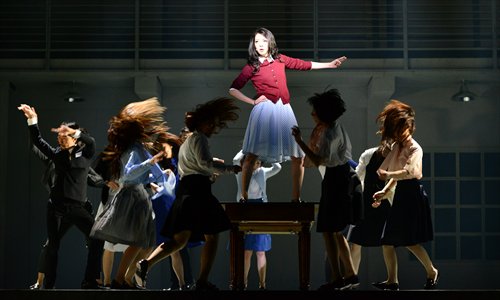 |
|
A scene from What is Success? Photo: Courtesy of Beijing Magique Culture
|
For audiences that have seen Sherlock Holmes tweeting or Dr Watson being played by a woman on TV, it is not so surprising to see a stage version of Sun Quan (182-252), the Wu emperor, in which he is a girl who likes playing video games.
Yes, we are at a time when almost all the famous classical works of literature have been adapted in every possible way, but it is still rare to meet a director like Edward Lam who loves to turn those characters into modern citizens.
Whether it is a Western classic such as Madame Bovary, War and Peace, or Great Expectations or a traditional Chinese story like Romance of the West Chamber, Lam always has his way of relating the situation to our daily lives.
After recreating Outlaws of the Marshes (What is Man?) in 2006 and A Journey to the West (What is Fantasy?) in 2007, Lam is going to bring a modern female campus version of Romance of the Three Kingdoms (What is Success?) to Chongqing, Guangzhou, Hangzhou, Beijing and Shanghai from August 9 to September 8.
Last Wednesday, Lam and writer Yang Zhao from Taiwan, who is also the literary consultant of What is Success?, held a talk in Beijing to discuss the relationship between the drama and what they wanted to share with the audience through the show, namely "the pain of youth."
Reality vs history
Featuring the history of Wei (220-265), Shu Han (221-263) and Wu (222-280), Romance of the Three Kingdoms is often seen as a textbook on strategy in which power, military might and fate are the key issues in a male-dominated world. Chinese audiences are very familiar with the classics - perhaps too familiar - and therefore have a collective impression of the books simply upon the mention of a name.
Watching Lam's adaptations, however, for many audiences, is a process of picking up the things they never thought about when first reading the books.
Lam likes to deconstruct many of the old images as he puts the characters into different backgrounds and wraps each play around an open question.
"If we use traditional impressions to read the classics, we will never receive new understandings. Only when using a way that takes out all the clichés can an adaptation be worthy [of the original]," said Yang. He explained that traditional Chinese novels usually follow a rule that characters never change personalities. This made it easier to tell stories in series in ancient times.
Lam's up-to-date interpretation gives new possibilities to the characters. As each character leads to a philosophical question, their relationships also break the old impression. Enemies are more like opponents.
